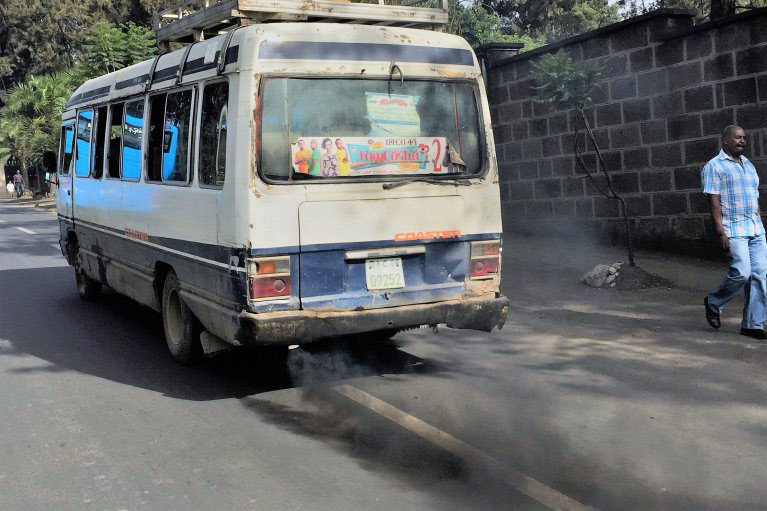
Godfrey Wasara WE are all aware of the form of transport ferrying the majority of commuters from various points in the cities to residential places scattered in these town.
The “chicken bus”, as it is popularly known in Zimbabwe, is back on the road. The bus that suffered technological obsolescence years back is once again on the road threatening the safety of both the commuters and the natural capital due to poor maintenance and excessive emissions.
One questions Zimbabwe’s commitment to safety of its people and current global attempts to save our planet.
Astronaut Bormann noted that those who have had a chance to watch the earth from as far as the moon, agree that the earth is small, and its resources are limited.
The population dependent on it is already too large, and continues to increase. Natural stocks of air and water are rapidly getting polluted with sewage and chemicals.
The best one can do is to realise that the resources we have are not inexhaustible. We, and the generations to come, all live on this planet.
Natural capital The concept came about when economists began to view stocks of clean water, air, forests, fisheries, and the ever-evolving system that supports them and us as natural capital.
The term was originally used to refer to those aspects that humanity exploited for its well-being such as fertile top soil. Growing awareness of the intricacy and delicate balance of the relationship between the natural environment and human economies is encouraging many to think of our total environment as precious natural capital.
- Chamisa under fire over US$120K donation
- Mavhunga puts DeMbare into Chibuku quarterfinals
- Pension funds bet on Cabora Bassa oilfields
- Councils defy govt fire tender directive
Keep Reading
Often ignored in macro—economic models and accounting, natural capital comes as an afterthought and disclosed in a hidden way as a fixed and indestructible factor of production. The renowned economist David Ricard called it “land” ignoring other vital components above.
Then, land was considered limitless and taken for granted. Less attention was given to it due to the belief that it was costless, and its supply was infinite. There is now pressure to economise natural capital.
The exploitation of natural capital is not sustainable. On the other hand, waste products from production are degrading and polluting the world’s stocks of natural capital.
It provides basic life support systems that no other form of productive capital can provide, multiple benefits simultaneously and we cannot reconstruct some elements of natural capital once they are destroyed.
Motorised public transport Due to low initial cost, flexibility, and versatility, motorised public transport entrepreneurship dominates markets for both passenger and cargo transport in most developing countries. Its dominance will continue for the foreseeable future.
Rapid population growth, urbanisation and excessive use of motor vehicles have generated mobility challenges in urban areas. Volumes of motorised transport are increasing, but unfortunately, the use of emission control technologies is limited.
Motor vehicles have become the number one source of urban air pollution in the developing world. Other negative impacts include accidents, noise, congestion, increased energy consumption, and greenhouse gas emissions.
Without mitigating interventions, living conditions in cities of the developing world will continue to deteriorate and finally become unbearable.
Air pollution is a well-known public health problem in most developing world cities. Epidemiological studies show that air pollution in developing countries account for high mortality rate, medical costs, and lost production.
Climate change and global warming Russia has said it will export to countries in Climate change is natural, as evidenced by the period like the ice age. What becomes of concern is accelerated climate change that we are experiencing now.
Atmospheric scientists believe that we are experiencing unusually rapid warming of the global climate due to human activities. Global warming happens when concentrations in the atmosphere of what are known as greenhouse gases — carbon dioxide, water vapour, methane, chlorofluorocarbons and nitrous oxide — increase.
Global warming relates to the “thin—film” covering planet earth. The earth is a closed system where nothing enters or leaves except the sun’s radiant energy.
Processes on earth occur when materials change forms; for example, gasoline used to move a vehicle. As it travels, the gasoline is not eliminated, but instead, takes some other form.
If such a closed system were to run indefinitely, the transformation system constitutes a closed cycle in which material returns to its original form: the new resource becomes useful matter which becomes waste which is then absorbed back into the ecosystem to become future raw material.
Other things remaining equal, it becomes a perfect self-sustaining cycle of life. Bottlenecks often occur in the conversion of raw material to the useful matter. The ecosystem has been running faster than it can sustain itself.
The bottleneck appears to have shifted to the waste disposal stage. Once humanity forces the system to run harder, the waste-carbon dioxide (CO2), emissions, chlorofluorocarbons (CFCs), acidified forests and polluted rivers get worse. Feeding coal to the steam engine is easier than getting CO2 emissions absorbed into the ecosystem.
Global warming and the earth’s closed system relate to the interaction between the sun’s heat and certain greenhouse gases in the atmosphere.
The sun’s energy comes to us through radiation, but almost all of that radiant energy is either reflected or radiated back into space. If it were not, the earth would then keep on heating up forever.
When it functions properly, a uniquely balanced system exists. But if — as scientists now believe it is happening — the composition of the trace gases in our atmosphere is altered by human activity, then more radiated heat is being trapped. Not only does the heat warm up the atmospheric gases but everything else as well.
The ozone layer that protects the earth and its inhabitants from harmful solar radiation is being significantly depleted by chemical emissions like CFCs.
The bigger the ozone hole, the more vulnerable human beings are, say to skin cancer. Without the earth’s atmosphere, temperatures would be about minus 18 degrees celsius, not comfortable when compared to our average normal temperature of 15 degrees celsius. Thus, the range of 33 degrees celsius is the reason why the earth is not cold and dead like Mars which, if ever it had an atmosphere, lost it long ago and is lifeless and frozen.
On the other hand, carbon dioxide constitutes the bulk of Venus’s atmosphere hence its temperature reaches 450 degrees celsius making life impossible.
While Mars is a deep freeze and Venus is a furnace, a thin film of matter – including its vital atmospheric gases – that permits life, wraps the earth. Should the composition of these gases alter dramatically, we would either return to the ice age or find our temperatures rising to uncomfortable or disastrous levels.
Impact on natural capital
Entrepreneurs carry out activities to create and subsequently increase their wealth.
Enterprises depend and impact on natural capital in one way or another and will, therefore, experience some risk and opportunities associated with those dependencies and impacts.
Resultant effects arise directly from business operations or indirectly from the use of products and services. Such effects occur at any point in the value chain through exploration and extraction of raw materials, intermediate processing, and production of finished goods, distribution, consumption, disposal, or recycling. Impacts include land degradation and air pollution while dependencies on natural capital include the production of crucial inputs like raw materials, water energy, natural filtration of water, waste assimilation, and protection from floods and storm drainage.
Conclusion British philosopher Malthus observed that population grew at a geometric progression while food production increased in arithmetic proportions.
Today many third world countries remain confined in the Malthusian trap.
Africa’s vast natural resources are under threat of desertification due to population growth, unsustainable exploitation of natural capital and ineffective waste management strategies.
Earth is the only asset we, as inhabitants, jointly own. We must act responsibly by avoiding careless exploitative tendencies and try to restore lost elements of natural capital.
Wasara is a management consultant, founder and managing consultant of Innovative Entrepreneurs Unlimited. — wasaraman@gmail.com










